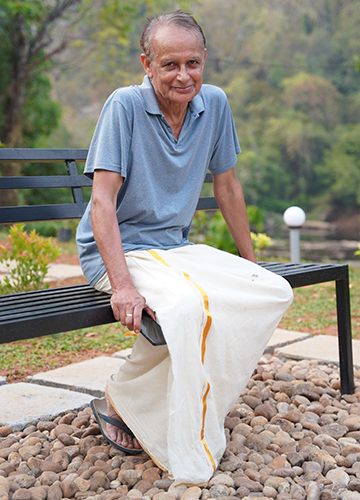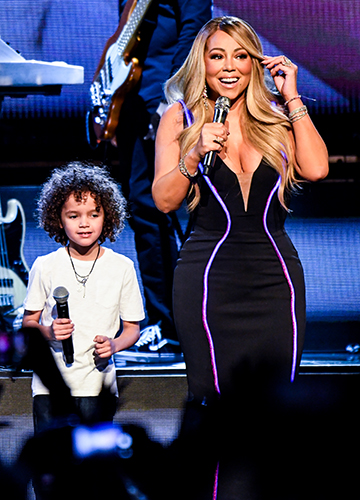On June 6, 1944―otherwise known as D-Day―the biggest seaborne invasion in history took place in France’s Normandy, when the Allied forces retook it in an operation codenamed Neptune during World War II. The operation made Major General Dwight D. Eisenhower, who commanded it, an overnight sensation. He would go on to become the 34th president of the United States. Exactly 11 years after the D-Day in Normandy, another kind of D-Day was happening to a Christian couple thousands of miles away. On that day, unbeknownst to President Eisenhower, his namesake was born in Oonjapara, a small agricultural village in Kerala.
So how did a Malayali boy get named after the American president? Some might call it a tale with a twist. When he was studying in the first standard, the boy, who was baptised as Issac, would bawl during attendance because his teacher, Varkey saar, would not call out his name. Not that he himself was sure what his name was. As punishment, an older student was asked to carry Issac home every time he started crying. This, however, only raised the decibel level of his wails. Fed up with all the ruckus during roll call, the teacher finally asked Issac why he was crying. “Because you don’t call out my name,” he replied. Varkey saar immediately took corrective measures and put down Issac’s name in the first standard register as ‘Isenhower’, who was the most powerful man in the world then and who had visited India a few months before his namesake joined school. The name stuck. Little Isenhower had no problem with it. He thought it was the English version of what he was called at home―‘Ise kunju’.
Years later, in 1966, when Isenhower got admission to a Sainik School, his father went to collect his Transfer Certificate, and was alarmed to see his son’s name printed as Isenhower in the document. He tried to tell the headmaster that the boy’s real name was Issac K. Joseph. “The name has been recorded in the list sent to the Assistant Education Officer and cannot be changed without a formal application, which might take some time,” the headmaster told him. And that’s how Issac officially became Isenhower, and, some time after he joined the Army, ‘Colonel Isenhower’. He says he has checked in the population register; he is the only one with this name in the country.
“The only pitfall is that I have no surname,” says Isenhower. “So, to buy train tickets and fill application forms, I use my rank―‘Colonel’―as my first name. Another problem with having a unique name is that everyone wants to know the story behind it. So, this must be the two thousandth time I am repeating my story.”
His story might be unique today, just like his name, but soon, it might no longer be. We might be approaching a day when Isenhowers will be the rule and Issacs, the exception. This is happening already. In many parts of the world, it is raining babies with unique names. Take Scotland, for example. 2023 was a record year for unique baby names. According to the National Records of Scotland (NRS), there were a record 2,362 boys with unique names and 2,983 girls with the same last year. Boys were named ‘Boy’, ‘Demigod’ and ‘Howl’, while girls got stuck with ‘Costly’, ‘La’, ‘Na’, and ‘Pasty’. Neither are babies ‘Banksy’, ‘Jihad’ and ‘Alloy’ likely to have it easy in life.
Similar trends are being observed in Japan and the UK. Last year, The Japan Times published a piece on baby names getting more creative. “Do more unique monikers mean Japan is becoming more individualistic?” it asked. In the UK, Sophie Kihm from Nameberry (a website devoted to baby names), told Metro, “Years ago, parents may have chosen a name because they liked the sound or it had a family connection, but today more than ever, baby names are seen as an opportunity to showcase style, culture, and hopes and dreams parents have for their child.”
So, how do unusual names impact a child’s personality? Surely, Baby Jihad could not go through life without at least one ‘What happens when a terrorist walks into a bar’ joke being lobbed at him. Experts, however, say it might not all be doom and gloom with unusual names. In fact, the opposite might be true. According to one study conducted at the Arizona State University, CEOs with unique names were found to be more creative and confident than their peers. Other research suggests that a person’s name can influence what job they get, who they marry, where they settle, and even what stocks they invest in. One study even concludes that we look like our names. Professor Anne-Laure Sellier and her team asked subjects to pick a name from a list of four or five options for the photo of a person that they showed. The subjects chose correctly more times than was likely to be accounted by the law of chance. To belong to their “tribe”, people tend to align themselves―through their clothes, glasses, tattoos, and hairstyles―to what they think someone with their name would look like, felt Sellier.
Unlike in the west, where names are chosen for their individualism, originality, and simplicity, in India, names are deeply rooted in custom, culture and ancestral roots, says Professor M.J. Warsi, chairman, department of linguistics, Aligarh Muslim University, and president of the Linguistic Society of India. “Children's names in India are determined by several variables, such as cultural and religious customs,” he says. “Names express ideals, beliefs, and heritage, and are frequently associated with religion and caste. To pay tribute to family legacy, children are frequently named after grandparents or other elders. Family history and origin play a major role.”
On the other hand, in the west, parents frequently value unique names, he says, taking cues from literature, popular culture or individual tastes. Gender-neutral names are becoming increasingly common, indicative of changing attitudes on gender and identity. Surnames are used to identify families, with less emphasis on religion or caste.
Not that unusual names, religion and caste neutral, are absent in India. We have a cricketer named Napoleon Einstein and a Meghalayan politician named Adolf Lu Hitler Rangsa Marak. There is a Reddit thread on people with unusual names in the country, which includes a science teacher who named his three children ‘Proton’, ‘Electron’ and ‘Neutron’. “My father gave me my name, but I don’t know why. He didn’t get it from a novel or anything. He told me: ‘I just got this feeling to name you Rinklet’,” says Rinklet Varghese, who works in real estate. “Of course, there are shortcomings with a name like mine. Friends used to tell me it sounds like something to eat. Also, very few people know how to pronounce it correctly. I’ve been called ‘Ringly’ quite a few times. Still, I like my name as it makes me feel unique. I don’t know of anyone else with my name. It has given me a sense of confidence.”
Not so lucky is Dr Loosamma Joseph, who says she hates her name. “It was supposed to be Lucy, but I studied in a convent school, where the nuns believed in adding ‘amma’ to girls’ names,” she says. “But I did not even realise that my name was spelt as ‘Loosamma’ until I saw my birth certificate just before taking my SSLC exams. Those days, there was no concept of changing your name, so I was stuck with it. During my MBBS, people used to call me ‘Loosy Loose’. Even now, there are those who call me ‘Loose’ (a slang for mentally unstable in Kerala).”
Names with a negative connotation can have a permanent impact on people since you tend to remember negative incidents more, says clinical psychologist Anita Rajah. “It is a survival mechanism of the brain,” she says. “Every time you are slighted, you tend to remember previous incidents of being slighted. Names are connected to emotions in a big way.”
Once upon a time, giving unusual names to their children was the preserve of celebrities. Naming their children ‘Sunday’ (the daughter of Nicole Kidman and Keith Urban), ‘Wolf Webster’ (the son of Kylie Jenner and Travis Scott), ‘North’ (the daughter of Kim Kardashian and Kanye West), 'Blue Ivy' (the daughter of Beyonce and Jay-Z) and ‘Moroccan’ (the son of Mariah Carey and Nick Cannon) was just another working day in Hollywood. In fact, The New York Times carried a piece in 2006 titled ‘Why Stars Name Babies Moxie, Moses and Apple’.
“You're likely to be the only one in any normal-size group with that name,” it quoted actor Penn Jillette, who named his daughter ‘Moxie CrimeFighter’. “'Moxie' is a name that was created by an American for the first national soft drink and then went on to mean 'chutzpah,' and that's nice. Everyone I know with an unusual name loves it. It is only the losers named Dave that think having an unusual name is bad, and who cares what they think. They're named Dave.”
In a world in which everything celebrities do is increasingly cut, copied and pasted, Ms CrimeFighter might indeed have the last laugh.





